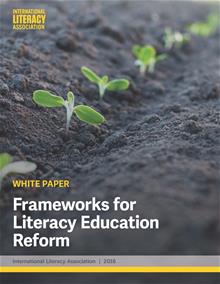 By what criteria can any of the many current proposals for literacy education reform be considered sound? The question is crucial, as the future of the nation’s children is bound up in the quality of the education they receive. To provide a practical perspective on how to answer it, ILA has issued a new white paper entitled “Frameworks for Literacy Education Reform.”
By what criteria can any of the many current proposals for literacy education reform be considered sound? The question is crucial, as the future of the nation’s children is bound up in the quality of the education they receive. To provide a practical perspective on how to answer it, ILA has issued a new white paper entitled “Frameworks for Literacy Education Reform.”
The central tenet of the white paper is that classroom literacy instruction should be grounded in rigorous, peer-reviewed research—not politics, ideology, or speculation. “Previous education policies have proven that there are no quick fixes to the challenges facing literacy education,” said D. Ray Reutzel, dean of the College of Education, University of Wyoming, and co-chair of the project team that produced the document.
Rather than settling on a specific reform strategy, the white paper offers frameworks for use in drafting or evaluating reform proposals. The frameworks address four key education sectors: literacy learning and teachers; schools and schooling; student support; and families and communities.
For each sector, the white paper offers a list of research-validated approaches to literacy advancement, which is designed to function as a rubric to inform, refine, and assess reform proposals. In addition, each framework includes a detailed list of supporting sources to facilitate exploration into the underlying research base.
“Research is the differentiator between the reliable and the uncertain in literacy education reform,” said Heather Casey, associate professor, Rider University, the project team’s co-chair. “ILA’s white paper provides a reliable grounding from a research-based perspective.”
ILA developed the white paper in response to today’s complex and evolving education landscape. With an increase in English learners, high-stakes testing, and digital technologies driving new modes of teaching and learning, challenges for the classroom teacher are mounting. The new white paper’s frameworks serve as a high-level rubric school administrators and policymakers can use to create or assess reform proposals.
“We urge communities implementing literacy education reforms to be thoughtful in their approach and use this white paper as a guide to the many decisions that they will face,” said Reutzel. “And when a decision is made on a specific evidence-based approach, stay the course and create stability. It takes time to prepare teachers and have the right specialized literacy professional in place to make sustainable, effective changes.”
In the coming weeks, Literacy Daily will delve deeper into the strategies for each of the education sectors.